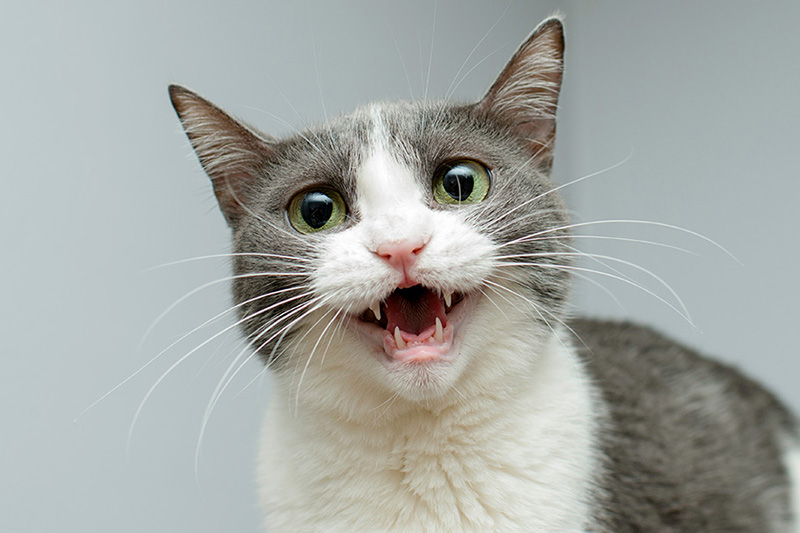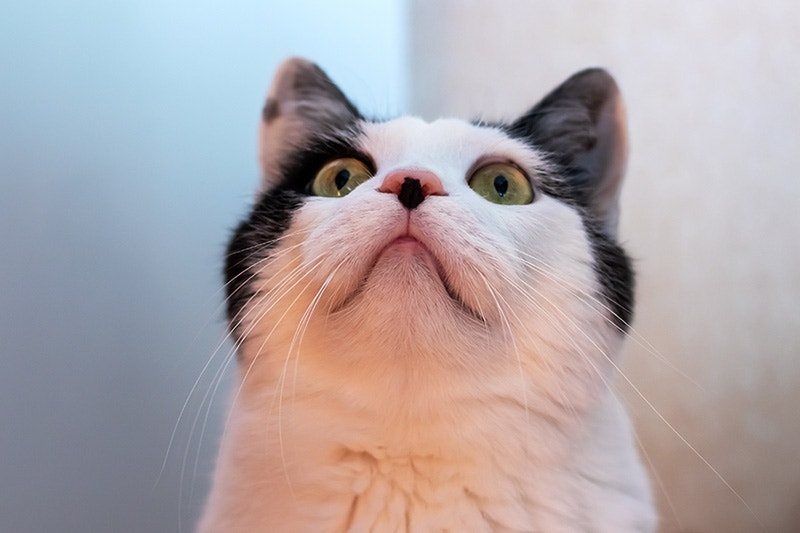Meowing is how cats communicate with people. You should always expect your cat to meow at you from time to time. Most meows from your furry friend are an affectionate hello or a polite request for something simple.
You might have noticed, however, that your cat is suddenly meowing more than you’re used to. Or it might be meowing in a different way. Otherwise, a new cat you’ve bought might be meowing more than you expected.
In this article, we’ll look at cat meowing. We’ll look at the reasons why cats meow, when you should worry if your cat keeps meowing and what to do to fix the situation.
It might be difficult to work out why your cat is meowing at first. But with a bit of investigation, you’ll normally be able to work out the reason.
Is It Normal for Cats to Meow a Lot?
All cats meow from time to time to say hello, make simple requests or to tell you there’s a problem. Meowing is a great communication tool that cats and people share. Most of the time, when a cat meows, it just wants to say hello and wish you well.
Different cats meow different amounts. Some cats like to stay reserved, while others like to shower their owners with nice meows.
Cat owners should get accustomed to their individual cat’s meowing habits and learn how vocal their cat normally is. All cats have unique personalities, and some like to meow more than others. Cats will also meow different amounts at different life stages. On top of this, some breeds of cat (such as Siamese cats) are known to be more vocal than others.
Why is my cat meowing a lot? Excessive meowing is normally considered to be when a cat meows more than normal, or if your cat’s meowing is disturbing you or making you worry.
Did you know that ageing could be the reason why your cat is meowing much more than it used to. Changes in health and cognitive function can make it harder for cats to go about their normal business. They might meow out of confusion or because they find some things tricky. Some cats also lose patience and become more demanding in old age.
Discover your cat’s life stage.
Common Reasons Why Cats Meow More Than Usual
Why does my cat keep meowing? Here are some reasons why your cat might be meowing more than normal:
- It’s hungry or thirsty – Check your cat doesn’t just need food or water. Cats will often meow and sit next to their food or water bowl to tell you they’re short. Otherwise, they might try to lead you to their bowl so you can see for yourself.
- Boredom, loneliness and need for attention – Cats will often meow when they want attention. It’s important to set aside enough regular time for bonding and playing cat games. If your cat deserves a bit of attention, then go ahead and give it some. Make sure you keep setting aside regular time as well. At the same time, you might find your cat is asking for too much attention. If this happens, ignore the meowing to stop your cat from demanding too much attention.
- Your cat is asking for something - The reason why your cat is meowing might be that it needs something like letting out the door or a litter change. Try offering to let your cat out, or see if it needs a litter change. Most cats only like to use a clean litter tray. Otherwise, see if there’s something else it needs.
- Mating season – One reason you might find your cat is suddenly meowing more than you’re used to is due to mating habits. If your cat hasn’t been spayed or neutered, you might find it meows loudly or even howls (mating calls are called caterwauling). You might notice that this happens at night, or your cat is doing it next to the windows.
- Stress or anxiety – Cats are sensitive to changes in their social groups and changes in their environment. If you’ve brought a new pet or a new person into your home, this could explain why your cat is meowing so much. Similarly, if you’ve lost someone from your home, this could also make your cat meow from anxiety or stress. Construction work or other changes in your cat’s territory can also cause anxiety or stress.
- Old age – The reason why your cat is meowing more than usual might be old age. As cats get older, their cognitive and physical condition declines. They might find it harder to do certain things, or they might find it harder to locate you. They might also struggle with confusion or forgetfulness. Otherwise, you might notice that your cat is meowing more at night. This is a problem to be aware of after the age of ten. Remember that your cat is just confused, and be patient with it. Night lights can help senior cats relax at night, and keeping the layout of your home consistent will help them find their way around.
- Medical issues – Cats might also meow more than normal if they are in pain or discomfort from a health problem. You should be particularly aware of this if your cat suddenly starts meowing and meows all the time, or if you notice any other behaviours that could indicate a health problem. For example, if your cat’s appetite changes, if it appears to be uncomfortable or if its litter habits change. Health issues can be difficult to spot, and you should always take your cat to the vet if you suspect a health issue might be making it more vocal than usual.
Why Is My Kitten Meowing So Much?
Kittens are naturally more vocal than juvenile and adult cats, and you should expect a kitten to meow a lot. Kittens need lots of attention, and they meow frequently to get it. Kittens will meow when they’re hungry or thirsty, if they’re cold, if they want their parent or even if they just want to be stroked.
Kittens may also meow more as they develop and start to move around more and explore their environments.

When Should I Worry About My Cat's Meowing?
If your cat’s meowing isn’t just part of its normal behaviour, you should always work out what’s going on. You can run through all the possible causes in our list and try and work out the issue. Most of the time, you’ll discover that your cat needs something simple like extra stimulation or more access to the outside.
Otherwise, you might become aware of issues that are causing stress to your cat, your cat's mating behaviour or difficulties it is experiencing because of old age. With some effort, you should be able to help your cat deal with the difficulty it’s facing.
The main reason to worry is if meowing could be caused by a health problem. If your cat suddenly starts meowing more than normal and the meowing is continuous, this could be a sign of a health problem. Similarly, if the meowing is accompanied by other worrying behaviour, this could also be a sign of a health problem.
Here are some other things to look out for if your cat is still meowing after you’ve checked for other causes:
- Hiding or becoming withdrawn
- Eating less
- Litter habits change
- Aggression or irritability
- Signs of physical discomfort
Cats hide pain and health problems very well. If you think your cat could have a health problem, take it to a vet.
Discover why your cat is not eating.
How to Help a Cat That Meows Too Much
Here are some basic things to do if you’re wondering why your cat meows so much:
- Stick to regular feeding times
- Make sure your cat always has water
- Set aside enough time for playing with your cat
- Make sure your cat has toys and other sources of mental stimulation (good window views can help)
- Let your cat outside if it wants to go out
- Regularly clean your cat's litter, as well as its food and water bowls
- Make sure it has clean bedding and an area to relax in
- Check it’s not too hot, cold or noisy in your house
- Make sure your cat has enough regular company
If you’ve checked all of these issues, the next things to consider are mating behaviour, stress and anxiety, old age and health issues.
Try to avoid giving your cat treats as a way to stop it meowing because this will only make it meow more!
How many treats should you give your cat?
Final Meow: Understanding the Noise
Why does my cat keep meowing? Meowing is your cat’s way of talking to you. Cats love to meow little hellos and reminders that they exist to their owners. They also meow at their owners because they trust them and rely on them for help. Some cats are also very vocal, giving their owners lots of their attention and affection with their meows.
Most meowing isn’t anything to worry about. Occasionally, however, meowing can seem out of place. If you find yourself wondering why does my cat meow so much, the best thing is to work out why they’re doing it. With a little time to observe your cat, you will normally be able to see what it is your cat wants. Most cats are normally just asking for simple things, or they need something like attention or regular access to the outdoors.
A great way to bond with your cat and reward it for good behaviour is with DREAMIES™ treats.
Always take your cat to the vet if you think it’s possible their excessive meowing could be caused by a health problem.
FAQ - Why Is My Cat Meowing So Much?
Why does my cat meow for no reason?
Cats always meow for a reason, it’s just not always easy to tell what the reason is. Sometimes cats meow simply because they’re bored, to say hello or to get your attention. Stress, old age or health problems can be other less obvious reasons for a cat meowing.
When should I be worried about my cat meowing?
The main reasons to worry why a cat is meowing so much are if there’s a sudden change in the amount they meow or if there are other signs of trouble. The best thing is always to investigate the cause of meowing and work out what to do.
Why has my cat suddenly become vocal?
If you suddenly find yourself worrying why is my cat meowing so much, check there aren’t any obvious causes. Your cat might just need food, water, to be let out or have another basic requirement. After this, you should consider more serious causes, such as health problems.
Why is my cat acting normal but meowing a lot?
There are lots of reasons why a cat might act normal but meow a lot. The best thing is to investigate all the possible causes. Meowing isn’t normally a reason to worry, but hidden causes of meowing can be stress, health problems or the effects of old age.












